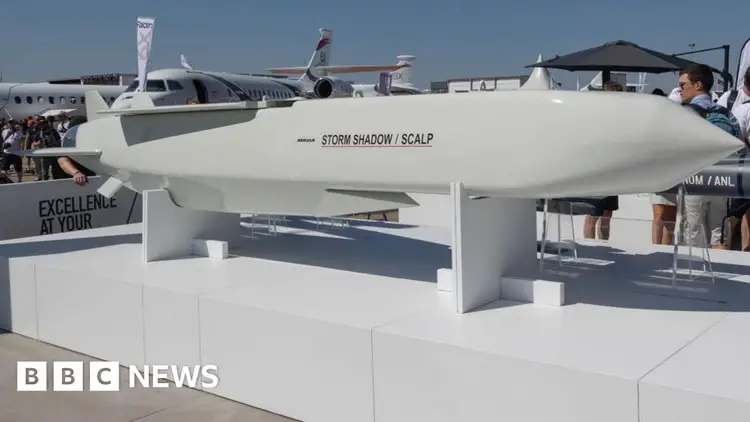Will Ukraine now strike Russia with UK weapons?

With the US now allowing Ukraine to use long-range missiles provided by America against targets in Russia, the question arises: What will the UK’s stance be?
Ukrainian President Volodymyr Zelensky has been advocating for approval from Washington to utilize the advanced US-made Army Tactical Missile System, referred to as ATACMS, to strike targets within Russia.
UK defense officials are looking to get permission from the US for Ukraine to use Storm Shadow missiles, supplied by Britain, to strike military sites within Russia.
However, London has been hesitant to act independently and has been waiting for a shift in the White House's stance, which finally happened on Sunday.
The shift in US policy allows Ukraine to utilize Storm Shadow with fewer limitations, addressing a request Ukraine has made for several months.
Storm Shadow missiles, along with their French counterpart known as SCALP, have been delivered to Ukraine in small numbers—typically in the low hundreds rather than in the thousands. To date, these missiles have only been utilized against targets within Ukraine itself.
Ukraine has already deployed them in attacks on Russian-held Crimea, such as striking the Russian naval headquarters in Sevastopol on the Black Sea.
These missiles are fired from planes and travel at nearly the speed of sound. They are equipped with powerful explosive warheads, making them perfect for breaking through Russian bunkers and ammunition depots.
Extended conversations about launching Storm Shadow missiles deep into Russian territory were brought up during the NATO summit in Washington in July.
Starmer emphasized that the missiles are intended for defense, but he noted that it is ultimately Ukraine's decision on how to use them.
In a post on X, Zelensky mentioned that he had received confirmation to use Storm Shadow missiles on military sites within Russian territory. He also noted that he and Starmer had the chance to talk about how to put this decision into action.
However, nothing significant took place following the summit.
Zelensky emphasized that utilizing long-range missiles is an essential component of his strategy for achieving victory.
He brought up the topic once more during his visit to Downing Street last month, where he briefed Starmer in a meeting that also included the new NATO secretary general, Mark Rutte.
Although there was no alteration in policy, Rutte mentioned that there was no legal barrier stopping Ukraine from targeting Russia, provided that the nations supplying the missiles approved of it.
UK Defence Secretary John Healey has made a concerted effort to refrain from expressing any public dissent with Washington. During a recent joint press conference with US Defence Secretary Lloyd Austin, when questioned on the topic, Healey stated that discussing these issues openly would only benefit Russia.
He's remaining discreet about the UK's stance at the moment. On Monday, he stated that he "won't comment on specifics regarding long-range missiles" when questioned about the UK’s weapons being used in Russia.
In reply to a question from DUP MP Sammy Wilson in the House of Commons, Healey remarked that engaging in public discussion poses a threat to operational security and that the only one who gains from such debates is President Putin.
He mentioned that he had a conversation with the US Secretary of Defense on Sunday regarding Russia’s increased activities over the weekend, and he planned to talk to the Ukrainian Minister of Defense later in the day on Monday.
"I want to make it absolutely clear to everyone here that the prime minister has emphasized the importance of intensifying our efforts to assist Ukraine for as long as necessary. We will persist in closely collaborating with the United States in our commitment to support Ukraine."
There is concern that even though many of Russian President Vladimir Putin's threats have been empty, enabling Ukraine to strike deep within Russian territory using missiles provided by the West might lead to a significant escalation of conflict.
Kremlin spokesperson Dmitry Peskov cautioned that President Putin has indicated that this kind of action would effectively mean that NATO is "at war" with Russia. He emphasized that any missile strikes would not be executed by Ukraine itself, but rather by the nations that authorize the use of those missiles.
Professor Justin Bronk from the Royal United Services Institute, a defense think tank, informed BBC News that it is "highly probable" that President Joe Biden's delayed choice to permit long-range attacks using ATACMS ballistic missiles will also pave the way for the Storm Shadow missile to be employed similarly.
He mentioned that the US likely dropped their objections for them.
At this point, Russian threats probably won't be seen as a serious warning. This is because Russia has consistently warned of severe repercussions, including hints at nuclear strikes, every time Western weapons have been provided during the war.
However, he mentioned that there's minimal evidence to suggest that increasing the operational range of the UK Storm Shadow will significantly impact Ukraine's capability to respond to Russia.
He pointed out that many of the key targets, like fighter bombers located at Russian airbases, are probably out of reach for these missiles in real-world situations. Additionally, there will be a restricted supply of these missiles left after their extensive use during the ongoing war.









































